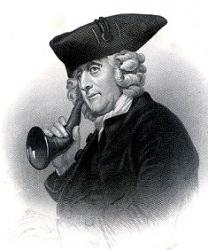Planning worship?
Check out our sister site, ZeteoSearch.org,
for 20+ additional resources related to your search.
- |
User Links
Person Results
Melchior Vulpius
1570 - 1615 Person Name: Melchior Vulpius, 1560-1616 Composer of "VULPIUS" in Hymnal and Liturgies of the Moravian Church Born into a poor family named Fuchs, Melchior Vulpius (b. Wasungen, Henneberg, Germany, c. 1570; d. Weimar, Germany, 1615) had only limited educational opportunities and did not attend the university. He taught Latin in the school in Schleusingen, where he Latinized his surname, and from 1596 until his death served as a Lutheran cantor and teacher in Weimar. A distinguished composer, Vulpius wrote a St. Matthew Passion (1613), nearly two hundred motets in German and Latin, and over four hundred hymn tunes, many of which became popular in Lutheran churches, and some of which introduced the lively Italian balletto rhythms into the German hymn tunes. His music was published in Cantiones Sacrae (1602, 1604), Kirchengesangund Geistliche Lieder (1604, enlarged as Ein schon geistlich Gesanglmch, 1609), and posthumously in Cantionale Sacrum (1646).
Bert Polman
Melchior Vulpius
James Hutton

1715 - 1795 Person Name: James Hutton, 1715-1795 Author of "Teach me yet more of thy blest ways" in Hymnal and Liturgies of the Moravian Church James Hutton, son of a clergyman and cousin to Sir Isaac Newton, was born in London, Sept. 3, 1715, and followed for some years the trade of a bookseller. In 1739 he visited the Moravian settlement at Herrnbut, where he became acquainted with Count Zinzendorf. He retired from business in 1745, and was ordained a diaconus of the Moravian Church in 1749. He died May 3, 1795. He contributed several hymns to the Moravian Hymn Book, 1754. All his hymns were included in an Appendix to his Memoirs, published by Daniel Benham in 1856.
--Dictionary of Hymnology, John Julian, 1907
=================
Hutton, James, p. 545, ii. Concerning his hymns we have to note: (1) that No. 3 [p. 546, i.] appeared in the Moravian Hymn Book, 1743, Pt. ii.. No. 242, as "Ah Love! come, sweetly bind me"; and that in some modern collections it begins "0 gracious Saviour [Shepherd], bind us;" (2) and that No. 4 also appeared in 1743, No. 284, as, "How shall the young men cleanse their ways.”
--John Julian, Dictionary of Hymnology, Appendix, Part II (1907)
James Hutton
Thomas Tallis

1505 - 1585 Person Name: T. Tallis Composer of "ORDINAL" in The Brethren Hymnal Thomas Tallis (b. Leicestershire [?], England, c. 1505; d. Greenwich, Kent, England 1585) was one of the few Tudor musicians who served during the reigns of Henry VIII: Edward VI, Mary, and Elizabeth I and managed to remain in the good favor of both Catholic and Protestant monarchs. He was court organist and composer from 1543 until his death, composing music for Roman Catholic masses and Anglican liturgies (depending on the monarch). With William Byrd, Tallis also enjoyed a long-term monopoly on music printing. Prior to his court connections Tallis had served at Waltham Abbey and Canterbury Cathedral. He composed mostly church music, including Latin motets, English anthems, settings of the liturgy, magnificats, and two sets of lamentations. His most extensive contrapuntal work was the choral composition, "Spem in alium," a work in forty parts for eight five-voice choirs. He also provided nine modal psalm tunes for Matthew Parker's Psalter (c. 1561).
Bert Polman
Thomas Tallis


 My Starred Hymns
My Starred Hymns


